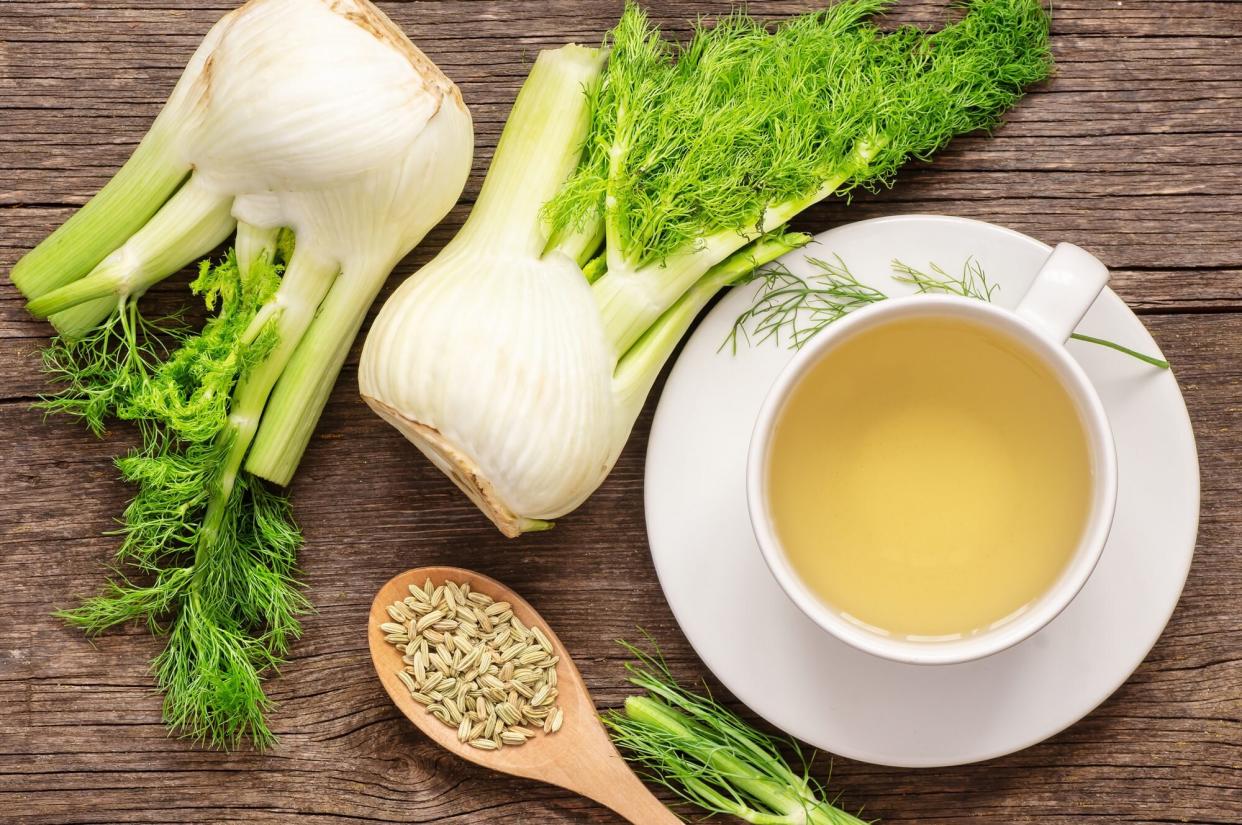How to Make Antioxidant-Rich Fennel Tea (and 5 Reasons to Try It)

mescioglu/Adobe Stock
You've probably seen fennel at the grocery store—a big green vegetable with a white and light green bulb, celery-esque stems, and feathery fronds that look like dill. There are countless delicious ways to cook with fennel or enjoy it raw. Thinly slice it for an earthy, crunchy raw-veggie salad or roast it in wedges until tender and use the fronds to garnish. Fennel seeds, too, are often used in cooking—in everything from sausage to stocks to savory breads—and lend recipes a distinct black licorice or anise flavor.
There's even more to fennel than its use in modern kitchens. Fennel, a member of the carrot family, originated along the Mediterranean Sea in the southern parts of Europe and has long been utilized for medicinal purposes. In fact, one popular and simple way to garner some of the healthy therapeutic properties of fennel is to drink it as a tea. Fennel tea is most often made with fennel seeds that have been lightly crushed to release their nutrient-rich oils.
"Historically, fennel was used for a wide range of ailments," says Kimberley Rose-Francis, RDN. "For example, fennel was used for digestive, reproductive, and endocrine issues. Studies show that fennel has antimicrobial, antiviral, and anti-inflammatory properties as well." And it's not just one part of fennel that's beneficial: "Its stem, fruit, leaves, seeds, and whole plant itself are medicinally used in different forms in the treatment of a variety of diseased conditions," she adds.
While fennel tea might not typically be your first choice of tea to sip on a chilly day, these five surprisingly powerful health benefits, according to research and nutritionists, may convince you to give it a try.
RELATED: 5 Healthy Reasons to Sip Cinnamon Tea
Health Benefits of Fennel Tea
Fennel tea supports digestion and gut health.
"Currently, one of the most popular uses of fennel is to aid digestion by smoothing the muscles of the gastrointestinal system in order to reduce gas, bloating, and cramping," says Kylene Bogden, RD, cofounder of FWDfuel. One study shows that fennel tea was effective in helping with gut recovery in women who had recent surgery for gynecological malignancies.
Fennel tea delivers a dose of antioxidants.
"Fennel tea is also consumed for its antioxidant status," Bogden says, including its "The intake of antioxidants helps to fight free radicals in the body." These free radicals can often lead to increased inflammation in the body and chronic disease. "Antioxidants help prevent this oxidative stress, which has been linked to cancer, heart, and respiratory related issues," Rose-Francis adds.
RELATED: Sip on These 7 Types of Tea to Help Soothe Inflammation
Fennel tea can help relieve menstrual cramps.
Looking for a natural way to manage period pain? Just as fennel can help relax the muscles in the gut to ease digestion, research has also concluded that it can be a helpful remedy for easing the intensity of painful menstrual cramps caused by uterine contractions.
Fennel tea boasts antibacterial properties.
Although further studies need to be done, fennel tea does show promise in having antibacterial properties against certain illnesses. The results of one study showed good inhibitory activity against the tested bacteria, and it may be worth exploring this property of fennel tea further in the future.
Fennel tea can be helpful for managing appetite.
"Research shows fennel seed may specifically aid in gut health and appetite suppression," says Rose-Francis, which can be a helpful way to curb overeating (a habit that can trigger inflammation, an overactive immune system, and other undo stress on the body). A small study demonstrated a decrease in hunger and increased feeling of fullness after overweight participants consumed fennel tea.
Are there any risks to drinking fennel tea?
Experts say it's best to sip sparingly. "Generally speaking, fennel tea should be safe when consumed in small amounts, however, fennel does contain estragole, which can be carcinogenic," Rose- Francis says. Bogden adds that drinking it in excess can potentially "lead to extra sensitive skin when exposed to sunlight, earlier breast development in young girls, and uterine contractions leading to premature delivery of baby."
As with any natural or herbal remedy, consult your doctor before drinking fennel tea, especially if you're pregnant or breastfeeding.
Fennel Tea Recipes
It's easy to make your own fennel tea at home. For the simplest approach: Take one teaspoon of fennel seeds and add it to two cups of boiling water. Allow the seeds to steep for a few minutes before drinking.
If you prefer something with a bit more flavor and variety, Bogden recommends the following recipe: Boil one and a half cups of water in a pot. Add one tablespoon of crushed fennel seeds and a quarter inch of lightly crushed ginger to the pot and let the mixture boil for three to five minutes. Strain it, add a half teaspoon of honey (or to taste), and enjoy.
If you're short on time or ingredients, most major grocery stores now sell fennel tea bags.

